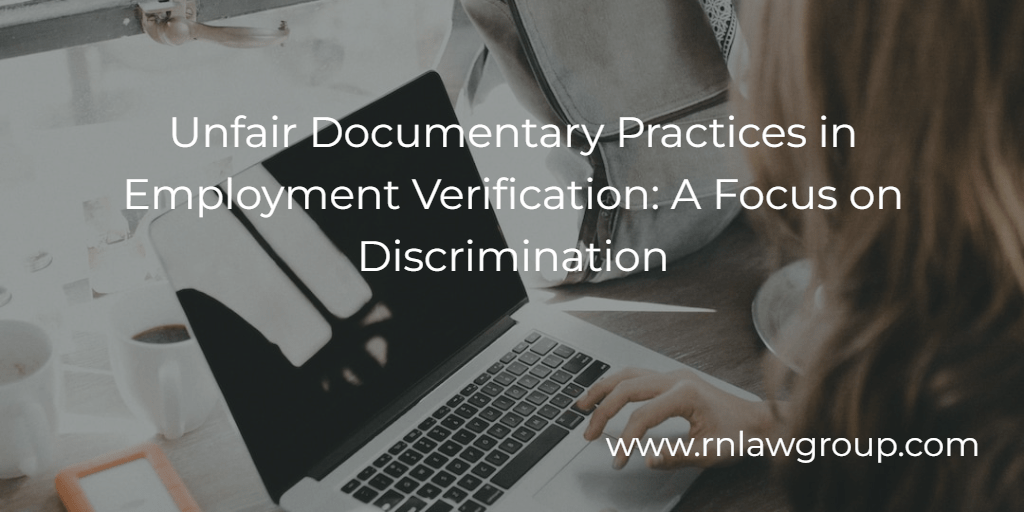
Unfair Documentary Practices in Employment Verification: A Focus on Discrimination
Earlier this month (June 2023), the Justice Department reached a settlement agreement with Colorado-based staffing agency Mountain Prairie Holdings, formerly known as Apprentice Personnel. The Justice Department previously determined that Mountain Prairie Holdings violated the Immigration and Nationality Act (INA) when the staffing agency discriminated against non-U.S. citizen workers when checking their authorization to work legally in the United States.
Form I-9 is used to verify the identity and employment authorization of individuals who are hired for employment in the United States. As required by law, all U.S. employers must properly complete Form I-9 for each employee hired in the United States to verify their work eligibility regardless of their citizenship or immigration status. Form I-9 must be completed by both U.S. citizens and non U.S. citizens hired for employment in the United States.
Within three (3) business days of the date when employment starts, the employee must present original documents to their employer to show proof of the employee’s identity and employment authorization. Employees are allowed to choose which document or documents they present. The list of acceptable documents can be found here. (https://www.uscis.gov/i-9-central/form-i-9-acceptable-documents) Employers cannot specify which document(s) an employee presents. Employers must physically examine each original document from the employee, determining if the document reasonably appears to be genuine and relates to the person presenting it.
As seen from the above list, List A documents establish both identity and employment authorization. List B documents establish identity and must be presented together with a List C document that establishes employment authorization. If an employee presents a List A document, the employer must not require the employee to present documents from List B and List C. Vice versa, if an employee presents documents from List B and List C, the employer must not require the employee to present a List A document.
The Justice Department received complaints from a newly hired non-U.S. citizen regarding Mountain Prairie Holdings and their I-9 practices. Despite the newly hired employee presenting sufficient documentation under the I-9 regulations to prove identity and work authorization, staff from the staffing agency demanded the employee present a foreign passport to further prove permission to work. From their investigation, the Justice Department determined the staffing agency routinely required non-U.S. citizens to provide additional immigration documents even when these workers had already presented valid and sufficient documentation of their authorization to work in the United States.
Under Federal law, all workers, regardless of citizenship, immigration status, or national origin, are allowed to choose which documentation to present to demonstrate their identity and work authorization as long as these documents are valid and legally acceptable as shown in the above linked list. In fact, many non-U.S. citizens, including lawful permanent residents, refugees and asylees, are eligible for several of the same types of documents to prove U.S. work authorization – these include driver’s licenses and unrestricted Social Security cards.
Employers must accept any document(s) from the Lists of Acceptable Documents as long as the document(s) reasonably appear to be genuine and relate to the person presenting them. The INA prohibits employers from committing unfair documentary practices in which employees are discriminated against when verifying their identity and employment authorization. Unfair documentary practices generally occur when employers treat individuals differently on the basis of national origin or citizenship or immigration status and can be categorized into three acts:
- Requesting that an individual produce more or different documents than are required by Form I-9 to establish their identity and employment authorization;
- Requesting that individuals present a particular document, such as a Form I-551, Permanent Resident Card, to establish identity and/or employment authorization; or
- Rejecting documents that reasonably appear to be genuine and to relate to the individuals presenting them.
Assistant Attorney General Kristen Clark of the Justice Department’s Civil Rights Division stated “demanding that workers provide more documentation than required by law to prove their permission to work causes unnecessary stress, financial hardship and obstacles to employment, especially for vulnerable workers. The Justice Department will continue to hold employers accountable for such discriminatory actions.”
Under the terms of the settlement agreement between Mountain Prairie Holdings and the Justice Department, the staffing agency is required to pay civil penalties to the United States and is subject to monitoring for a three-year period. Additionally, Mountain Prairie Holdings is required to train its staff on the INA’s anti-discrimination provisions and review and revise its employment policies before the company or any of its subsidiaries can hire new employees.
A properly completed Form I-9 is not only an essential tool used for verifying the identity and employment eligibility of all employees, but also protects both employees and employers from legal and financial consequences that may arise from unauthorized employment. Improper completion of the form can lead to significant penalties and fines to the employer, therefore, employers need to fully understand the requirements and follow best practices to avoid mistakes. Reaching out to experienced attorneys who understand these requirements will help employers ensure they are protecting themselves, their employees, and the U.S. workforce in general.
For over 25 years, Reddy Neumann Brown PC has worked with employers to protect their businesses from the potential consequences of worksite noncompliance related to hiring and the retention of employees. Our firm guides employers to ensure full compliance with all Form I-9 requirements by conducting internal audits of a company’s records, processes, and procedures.
By: Jessica Palarca
Jessica Palarca is an attorney in Reddy Neumann Brown’s PERM Labor Certification Department where she assists clients in the beginning stages of the green card process.
Jessica earned her J.D. from the University of Houston Law Center in 2009 and was admitted into the Texas bar the same year. As the child of two immigrant parents, Jessica found her passion for immigration law early in her career. With over a decade of experience in both the private and non-profit sectors, she brings a different perspective to each case she handles. Through the years, Jessica has learned that to achieve the best possible results for each individual served, one must keep things simple and provide personalized attention and care to each case.

